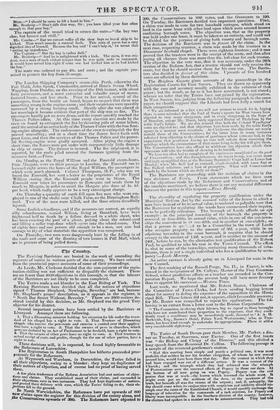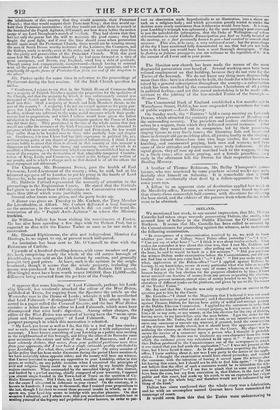The Tories of South Devon gave their Member, Mr. Parker,
a din- ner on Tuesday, at Starcross, near Exeter. One of the first toasts was "the Bishop and Clergy of the Diocese," and this elicited a long speech from the Reverend Dr. Collins. The following passage is a sample of the reverend gentleman's oration.
" Had this meeting been simply and purely a political one, it WAS most probable that neither he nor his brother clergymen, of whom he saw several around him, would have been there that day. But the contest in which they had been engaged was one of a different nettle. It was a contest of the Church ; and the triumph which they had achieved was the triumph of Protestantism over the renewed efforts of Popet y in these our days. At the bottom of all now going on was Popery. Popery was the evil genius that was at work—the leaven which leavened the whole mass. It might even put on the mildness of the dove, or the meeknesa of the lamb, bin beneath all was time venom of the serpent ; and, if, unhappily, the day should come when its conjunction with scepticism and infidelity should tri- umph over the ruins of the Established Church, it would speedily exchange the language of toleration for the commands of a task- mistress, fiw Popery and liberty were incompatible. In the Southern division of the county, however, the electors had spoken in a manner not to be misunderstood. They had told Ile inhabitants of this country that they would maintain their Protestant Climb; that they would support their Prote,tant King; that they would up. held their Protestant institutions; that they would not suffer them to crouch at the footstool of the Popish Agitator, O'Connell, nor bow down before the molten image of my Lord Brougham's march of iotellect. They had shown that they lad not only the power but the will to maintain the good cause; they had fought the good fight, and if ever the time should come when persecution 'honld again assail the Protestant Church, there would not be wanting among the men of South Devon worthy imitators of the Latimers, the Cranmers, and the Ridleys, ready to testify, even at the stake, and to sacrifice even their lives ihr the purity and preservation of the Protestant Church. With this good cause had Mr. Parker identified himself ; he had come forward at a time of creat emergency, and Devon, nay England, owed him a debt of gratitude. hough young and; comparatively, inexperienced—though having to contend with all the power of the Government—he conquered his opponents, and tn. straphantly lit up the name of Protestantism ji em one end of the kingdom to the other."
Mr. Parker spoke for some time in reference to the proceedings of Parliament during the last session. Of the Irish Church question he said- " Gentlemen, I rejoice to say that in the British House of Commons there was a majority of English Members against the proposition for the spoliation of the Church, and that the majority by which it was unfortunately carried was composed of Scotch and Irish :Members only. The question, then, resolves itself into this: Shall a majority of Scotch and Irish Members dictate to the rest of the country ? A majority, I do not say ranged against us for party pur- poses, but I do believe the object of which was to restore the present Munstry to office, without any reference to the many useful measures which their prede- cessors had in preparation, and which I believe would have given the fullest satisfaction to the country. On this unfortunate question the 'louse of Lords also did their duty. They proclaimed in the face et the whole nation that they -would not suffer the revenues of the Irish Protestant Church to be alienated to (imposes which were not strictly Ecclesiastical and Protestant, far less would they suffer them to be banded over to those who cordially hate and despise us. Gentlemen, it is true I have had but little experience in political life, yet, without being guilty of any degree of prophetical hallucination, I think I may venture boldly to assert that there is abroad in this country at this moment a dangerous and active spirit, the strong and unceasing desire of which is to establish a Democracy,—a Democracy which can never be established but on the mins of the empire, on the destruction of that admirably-tempered Constitu- tutien of King, Lords, and Commons, so suited to the feelings and welfare of our people, and to which a change such as that desired is of all the others the meet repugnant and abhorrent."
The Chairman, Mr. Beaumont Sweet, gave the health of Earl Fortescue, Lord-Lieutenant of the county ; who, he said, had at his advanced age gone off to London to put his proxy in the bands of Lord tlarrowby, to be used against the present 'Ministry. Mr. Baldwin Fultbrd represented the necessity of attention to the proceedings in the Registration Courts. He stated that the Radicals bad given in no fewer than 1300 objections to Conservative voters, not more than '200 of which 3N-ere justifiable ones.
Several other toasts were given, awl the party broke up.
A dinner was given on Tuesday to Mr. Corbett, the Tory Member for Lincolnshire, at Alford. Mr. Corbett delivered a long harangue on the occasion ; in the course of which he did •rot omit the usual de- nunciation of the " Popish Arch-Agitator" to whom the Ministry truckled.
Sir William Follett has been visiting his constituents at Exeter, He has also been spending a few days with Sir Robert Peel, but is expected to dine with the Exeter Tories as soon as he can make it convenient.
Mr. Iloward Elphinstone, the able and independent Member for Hastings, is, we regret to say, at present much indisposed.
An invitation has been sent to Mr. O'Connell to dine with the ileformers of Carlisle.
Upwards of a hundred dwelling-houses, with sonic meadow and gar- den land, comprising nearly the whole of the old rotten borough of Bletellingley, were sold on the Lith instant by auction, and generally brought very good prices. At least, such is the opinion in the neigh- bourhood; though it seems that the whole property, including the naanor, was purchased for 11,0001. Before the Reform Bill 'passed, Bletchingley must have been worth nearer 100,0001. than 11,0001.—the difference being extracted from the pockets of the People.



























 Previous page
Previous page